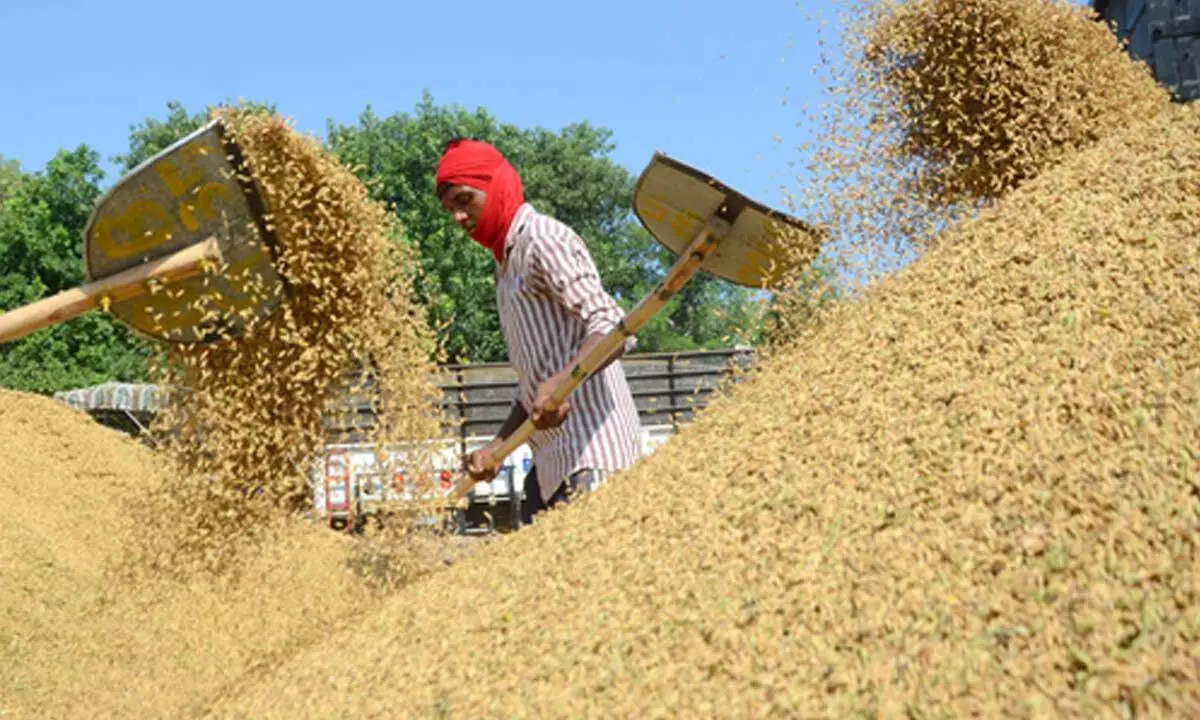Live
- They always want me to win, and now I feel lucky to have been offered a story like ‘Zebra’: Satyadev Kancharana
- ‘Democracy first, humanity first’: PM Modi in Guyana's parliament on two countries' similarities
- PKL Season 11: Telugu Titans register third straight win to top standings
- Is Pollution Contributing to Your COPD?
- NASA Unveils Underwater Robots for Exploring Jupiter's Moons
- Additional Central forces arrive in violence-hit Manipur
- AR Rahman and Saira Banu’s Divorce: Legal Insights into Common Issues in Bollywood Marriages
- 82.7 pc work completed in HPCL Rajasthan Refinery area: official
- Curfew relaxation extended in 5 Manipur districts on Friday
- Tab scam prompts Bengal govt to adopt caution over fund disbursement
Just In

The Government of India has made declaration of stock position of rice/paddy mandatory for traders/wholesalers, retailers, big chain retailers and processors/millers.
New Delhi: The Government of India has made declaration of stock position of rice/paddy mandatory for traders/wholesalers, retailers, big chain retailers and processors/millers.
The initiative has been taken to manage the overall food inflation and to prevent unscrupulous speculation.
The Ministry of Consumer Affairs, Food & Public Distribution said that this order will be implemented in all the states and Union Territories until further orders.
The respective legal entities -- traders, wholesalers, retailers, big chain retailers, processors and millers -- have to declare stock position of paddy and rice in categories such as (i) Broken Rice, (ii) Non-Basmati White Rice (iii) Parboiled Rice (iv) Basmati Rice (v) Paddy.
The entities are expected to update it every Friday on the portal (https://evegoils.nic.in/rice/login.html) of the Department of Food and Public Distribution. The stock position of rice shall be declared by these entities within seven days of issuance of the order, an official said.
Further, to check inflationary trends in food economy, it has been decided to start retail sale of ‘Bharat Rice’ to general consumers.
In the first phase, 5 LMT of rice has been allocated for retail sale under ‘Bharat Rice’ brand through three agencies -- NAFED, NCCF and Kendriya Bhandar.
Retail price for the sale of Bharat Rice to general consumers will be Rs 29/kg. Rice will be sold in 5 kg and 10 kg bags. Bharat Rice will be available for purchase from mobile vans and physical outlets of the three central co-operative agencies to begin with, and it will also be available through other retail chains including e-commerce platforms very soon, the ministry added.
The ministry said that domestic prices of rice are increasing despite good crop this Kharif season, ample stocks with FCI and in the pipeline, and various regulations in place on rice exports. The retail prices have increased by 14.51 per cent over the past year. In an effort to curb the prices of rice, various steps have already been taken by the government.
Sufficient stock of good quality rice is available with the FCI, which is being offered to traders/wholesalers under OMSS at a reserve price of Rs 29/kg. In order to increase the sale of rice in the open market, the government reduced the reserve price of rice from Rs 3,100/Qtl to Rs 2,900/Qtl, and the minimum and maximum quantity of rice was revised to 1 MT and 2,000 MT, respectively, official added.
The ministry said that the export policy of Broken Rice has been amended from “Free” to “Prohibited” with effect from September 9, 2022.
In respect of Non-Basmati rice, which constitutes about 25 per cent of total rice exports, an export duty of 20 per cent has been imposed with effect from September 8, 2022 to lower the prices of rice. Subsequently, the export policy for Non-Basmati White rice was amended to "Prohibited" with effect from July 20, 2023.
In order to increase the availability of wheat in the open market and to control the prices of wheat, the Government of India has been offloading wheat in the market through weekly e-auction from June 28, 2023.
A total of 101.5 LMT wheat has been allocated by the Government of India for offloading under the Open Market Sale Scheme (Domestic) at reserve price of Rs 2,150/Qtl for FAQ and Rs 2,125/Qtl for URS, the official added.

© 2024 Hyderabad Media House Limited/The Hans India. All rights reserved. Powered by hocalwire.com






